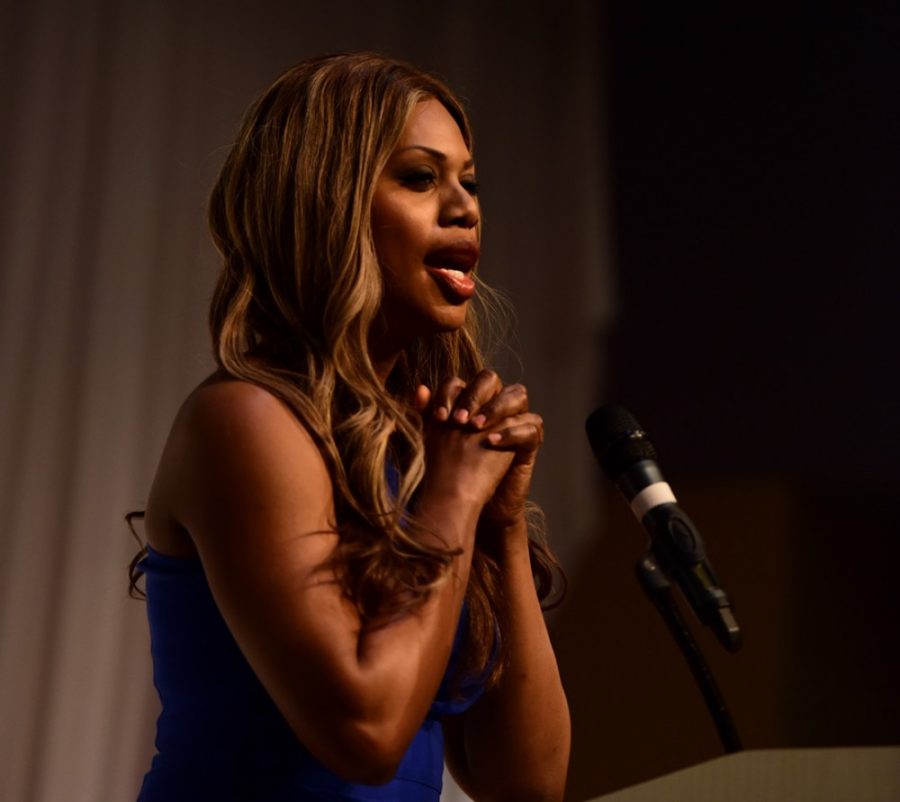“Empathy is the antidote to shame.” “Justice is what love looks like in public.” “I’m not just one thing, and neither are you.”
These were only a few inspirational words given during Laverne Cox’s hour-long event at the UA on Monday night. The supporting star of Netflix’s “Orange Is the New Black” and an Emmy-award winning executive producer of “Laverne Cox Presents: The T Word” discussed her life as a trans woman of color and the journey she has taken to become one of the most recognizable transgender activists in the world today.
Walking out to a standing ovation, Cox said, “That is how a lady should enter a room.” As the applause quieted down, Cox began her talk, “Ain’t I A Woman: My Journey to Womanhood.” The star began with how she grew up in Mobile, Ala., to a single mother. She highlighted how in school, teachers would express concern to her mother over her actions, citing one incident where she used a hand fan pretending she was Scarlett O’Hara from “Gone with the Wind.”
Cox informed the audience of how this incident prompted her mother to place her in therapy in third grade, following the teacher’s claim that she “will end up in a dress in New Orleans.” This therapy session asked Cox the question, “What is the difference between boys and girls?” Cox said she told the therapist, in all her wisdom as a third grader, that there is none.
Cox continued to detail how in her younger years, she was bullied and called a variety of anti-gay slurs for expressing her femininity. She said she felt shame for the way she felt, as she added that when she reached puberty, she began to realize she had feelings for boys. This shame reached a pinnacle when her grandmother died.
“I imagined that she was extremely disappointed in me,” Cox said, “and the idea of disappointing Madea made me not want to live.”
Cox said that 41 percent of transgender people report attempted suicide compared to 1 percent of the rest of the population, and this was not the only shocking number of the evening. Quoting the National Coalition of Anti-Violence Programs, the homicide rate in the LGBTQ community is highest amongst trans women; over 72 percent of LGBTQ homicides in 2013 were against trans women, and 67 percent were trans women of color.
“If we are truly serious about ending the bullying of our LGBTQ youth,” Cox said, “we have to begin to create spaces of gender self-determination for all our youth.”
Cox told everyone how her passion for dancing was what kept her alive. She said that in third grade when she had expressed a desire to do so, her mother had allowed her to take part in dance, which would eventually lead her to pursuing a dance education.
Cox said that during this time, she discovered the racial and class differences that would bring her further shame. However, she also said her time in high school was when she began to wear makeup and dress more feminine, calling her style at the time “Salvation Armani.”
Cox moved to New York during her college years where she joined the “Club Kid” scene. She said during this time, she made friends with another individual named Tina Sparkles. Cox said seeing how Tina transformed from a queen to a graceful woman was what gave her the courage to begin her own transition.
In regards to the event’s success, Monica Jones, the transgender woman arrested in Phoenix in 2013 under the law dubbed “Walking while Trans,” said the event would have been more successful if the school had reached out to transgender women of color.
“It would have been great to see more trans people of color here and having the recognition,” Jones said. “Trans people of color should have been front and center.”
Jones added that a major issue is the fact that these individuals cannot always have access to higher education. This issue was a question Jones posed for Cox during the question and answer session, in which audience members could tweet questions using the hashtag #UALaverneCox.
At the end of the evening, Cox was presented with the inaugural Alexander John Goodrum catalyst for change award for movement-changing work in gender justice by the Southern Arizona Gender Alliance.
For the LGBTQ community and allies present at the event, Cox offered a piece of advice: “Success really is the best revenge. Remember that, kids.”
_______________









